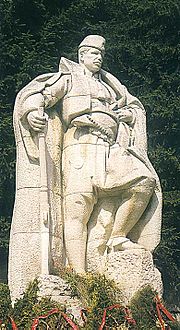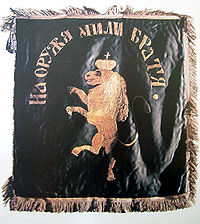- Hadzhi Dimitar
-
Dimitar Nikolov Asenov (Bulgarian: Димитър Николов Асенов) (10 May 1840 – 10 August 1868), better known as Hadzhi Dimitar (Хаджи Димитър), was one of the most prominent Bulgarian voivods and revolutionaries working for the Liberation of Bulgaria from Ottoman rule.
Contents
Biography
Early life
Dimitar was born in Sliven to the family of the merchant Nikola Asenov and his wife Marinka Asenova. When he was two years old, his family went on a pilgrimage to Jerusalem, from which point onward, Dimitar was considered to be a hajji (хаджия).[1] During Hadzhi Stavri's Uprising of 1862 Hadzhi Dimitar wandered through the Balkan Mountains with a band of revolutionaries for the whole summer.
Early revolutionary work
He joined the band of Stoyan Voyvoda in 1864 as a standard bearer. The band consisted of twelve people and was formed after the murder of the Greek bishop of Veliko Tarnovo. However, it disbanded before entering the city and its members separated from their leader. Hadzhi Dimitar assumed command and led the band into the Balkan Mountains near Sliven and then to Romania in August.
Another band was formed in the home of Georgi Sava Rakovski on 21 May 1865. Among its members were Hadzhi Dimitar, Stefan Karadzha, Yurdan Yurdanov, Petar Shivarov and Todor Shivarov. The band crossed the Danube near Silistra on 13 June and headed for the mountains near Kotel through the Ludogorie. It was active in the region of the Tundzha, Tvarditsa, Karlovo, Gabrovo and the well-known hajduk gathering place Aglikina Polyana. This band returned to Romania in August 1865.
A 20-member band crossed the Danube from Romania in the summer of 1866. It was led by Dyado Zhelyo, Hadzhi Dimitar and Stefan Karadzha. It split into three after reaching the mountains and was active until the autumn, when it regrouped to return to Romania.
Hadzhi Dimitar and Stefan Karadzha's band
The band of Hadzhi Dimitar and Stefan Karadzha was established in Romania in 1868, with many of the members being former participants in the unsuccessful Belgrade-based Second Bulgarian Legion. Dimitar's band crossed the Danube at Vardim in a sailing boat on 5 July and engaged in a battle with a Ottoman pursuing party of a thousand men in the vineyards of Karaisen near Pavlikeni. The band managed to give the enemy the slip and reached the territory of Gorna Lipitsa. A second battle followed there on 7 July, in which the band caused considerable damage to the Ottomans while only losing one member and getting two others wounded. The band proceeded to Vishovgrad, where it also fought on 8 July. On the next day, not far south-southeast, there followed a bloody fight in which Karadzha was wounded and captured and the band was defeated. The remaining 58 members proceeded to the Balkan Mountains under the leadership of Hadzhi Dimitar only to be crushed at Buzludzha Peak on 18 July. After being defeated in this last battle,heavily wounded leader Hadzhi Dimitar was carried on a stretcher by his survived comrades away from Ottoman army, on Mount Kadrafill,3 km from village of Svezhen.There he and his fellows were supported by the local people with water,food and herbs,till his death somewhere around the middle of August 1868,when he was buried beneath the same mount.On 6.November 1880,the bones were reburied in the yard of"St.Peter and St.Paul"Church in the village of Svezhen.The funeral service was conducted by the Bishop of Plovdiv † Gervassius of Levkia,who made Hadzhi Dimitar a martyr.After nearly two months,the bones of the hero were required and given to his mother,who brought them to his birthplace in Sliven town. His death inspired Hristo Botev's poem "Hadzhi Dimitar" in 1873.[2]
- "He,who falls while fighting to be free can never die: for him the sky and earth, the trees and beasts shall keen, to him the minstrel's song shall rise..."
Notes
- ^ Although the term hajji suggests the pilgrimage of a Muslim person to Mecca, it was also widely used by Christians in the Ottoman Empire to refer to a Christian who has completed a pilgrimage to Jerusalem. Its status as an honorific title remained unchanged.
- ^ In Bulgarian: http://www.litclub.com/library/bg/botev/poezia/hd.htm
Categories:- 1840 births
- 1868 deaths
- People from Sliven
- Bulgarian revolutionaries
Wikimedia Foundation. 2010.


